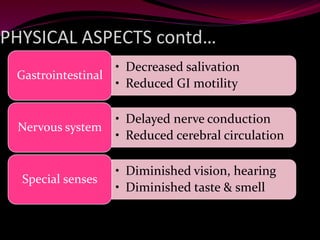Care of aged
- 1. BY:GROUP 4
- 2. TERMINOLOGIES U NEED TO KNOW: AGING: It is the normal process of becoming older. It is a time-related change which begins with birth & continues through out life. GERIATRICS: It is the study of old age that includes the physiology,pathology,diagnosis, & Mx of the disorders & diseases of older adults.
- 3. TERMINOLOGIES contd…. GERIATRIC Nsg: It is the field of nsg that relates to the assessment,nursing diagnosis,planning,implementation & evaluation of older adults in all envrnmnts including acute, intermediate & skilled care as well as within the community GERONTOLOGY: The combined biologic, psychologic & sociologic study of older adults within their envrnmnt
- 4. CHARACTERISTICS OF AGING: 1. Increased MORTALITY 2. CHANGES in the body’s CHEMICAL COMPOSITIONS (decrease in lean body mass, increase in fats & lipofuscins, &cross-linking of collagen tissues) 3. Progressive DETERIORATIVE changes 4. Reduced ADAPTATION ABILITY to envrnmntal changes 5. Increased VULNERABILITY to multiple diseases
- 6. THEORIES OF AGING: BIOLOGIC THEORIES: Intrinsic aging Genetically programmed Essentially universal & irreversible DEVELOPMENTAL THEORIES: (Erikson,1963) Life consists of 8 stages Each represents a crucial turning point in life Major task: achieve ego integrity or to suffer despair
- 7. THEORIES contd…. DEVELOPMENTAL TASKS FOR OLDER ADULTS…. (Erikson + Havighurst’s concepts) 1. Maintenance of self-worth 2. Conflict resolution 3. Adjustment to the death of significant others 4. Environmental adaptation 5. Maintenance of optimal levels of wellness
- 8. THEORIES contd….. SOCIOLOGIC THEORIES: Social interactions & roles contribute to successful adjustment Continuity & connection to the past are maintained through a well established habits, values & interests The theories emphasize the importance of environmental & psychosocial factors in the developmntal & current functiong of the person
- 9. THEORIES contd…. NURSING THEORY: (Miller, 2004) Challenges nurses to consider the effects of normal age-related changes as well as the damage incurred through disease or environmental & behavioral risk factors It suggests that, nurses can alter the outcome for patients through nursing interventions
- 11. PSYCHOSOCIAL ASPECTS Problem in adapting to…… Physical Social & Emotional losses & to achieve contentment Life satisfaction Serenity
- 12. PHYSICAL ASPECTS • Decreased cardiac output • Slower heart recovery rateCardiovascular • Increase residual lung volume • Decreased gas exchangeRespiratory • Decrease protection against trauma & temperature • Diminished secretion of natural oils & perspirationIntegumentary
- 13. PHYSICAL ASPECTS contd…. • Female: vaginal narrowing & decreased elasticity • Male: slower sexual response Reproductive • Loss of bone density & muscle strength • Degenerated joint cartilage Musculoskeletal • Male: BPH • Female: incontinence Genitourinary
- 14. PHYSICAL ASPECTS contd… • Decreased salivation • Reduced GI motility Gastrointestinal • Delayed nerve conduction • Reduced cerebral circulation Nervous system • Diminished vision, hearing • Diminished taste & smell Special senses
- 15. COGNITIVE ASPECTS INTELLIGENCE Decline Diminished problem solving ability Learning & memory Variation in motor & sensory function Poor ability to learn effectively due to poor intelligence
- 16. PHARMOCOLOGIC ASPECTS Altered pharmacokinetics Drug-food interaction Changes in gastric PH Decrease in GI motility
- 17. HEALTH PROMOTION STRATEGIES CARDIOVASCULAR RESPIRATORY Exercise regularly Pace activities Avoid smoking Eat low-fat, low-salt diet Participate in stress reduction Regular BP checks Medication compliance Weight control Adequate fluid intake to liquefy secretions Yearly influenza immunizatn Avoid exposure to URI Stop smoking Exercise regularly
- 18. PROMOTION STRATEGIES contd… INTEGUMENTORY MUSCULOSKELETAL Avoid solar exposure Use Seasonal clothing Lubricate skin Maintain safe indoor temp Shower pref to tub bath Exercise regularly Eat high-calcium diet Limit phosphorus intake Take calcium & vitamin D supplements as prescribed
- 19. PROMOTION STRATEGIES contd.. GENITOURINARY Seek urology check-ups Wear easily manipulated clothing Drink adequate fluids Avoid bladder irritants Do pelvic floor muscle exercises GASTROINTESTINAL Use ice chips Brush, floss, & massage gums daily Receive regular dental care Eat small frequent feeds Limit antacids Eat high fiber diet Limit laxatives
- 20. PROMOTION STRATEGIES NERVOUS SYSTEM SPECIAL SENSES Pace teaching Enhance sensory stimulatn Encourage slow rising from a resting position Wear eyeglasses Avoid night driving Use contrasting colors for color coding Avoid glare of shiny surfaces Avoid direct sunlight Speak with low-pitched voice
- 21. MENTAL HEALTH PROBLEMS DEPRESSION DEMENTIA DELIRIUM
- 22. DEPRESSION Feeling of sadness Fatigue Diminished memory & concentration Feeling of guilt & worthlessness Loss of appetite Sleep disturbance
- 23. DELIRIUM Altered level of consciousness Ranging from stupor to excessive activity Disorganized thinking Hallucination, delusion Fear & anxiety
- 24. DEMENTIA Alzheimer’s disease Progressive, irreversible, degenerative neurologic disease Memory loss, difficulty in work Vascular dementia Multi-infarct dementia associated with hypertension & cardiovascular disease Downward decline in mental function, sub clinical stroke
- 25. NURSES ROLE IN CARE OF AGED Knowledgeable about geriatric nursing Skilled in meeting the needs of older patients Understand that aging is not synonymous with disease Understand that aging is a highly complex & varied process Consider functional assessment as a common frame work Help older people to maintain max autonomy & dignity despite of physical & psychological losses Early interventions can prevent further complications
























